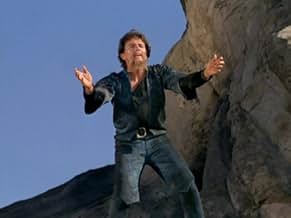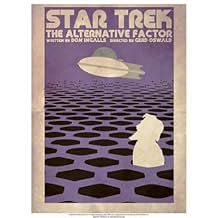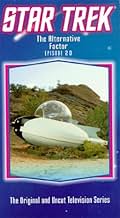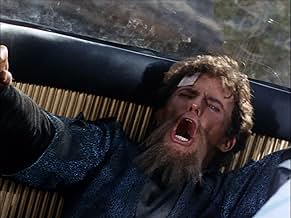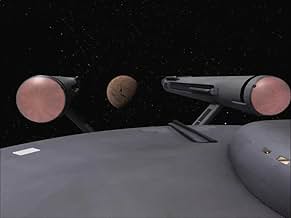The Alternative Factor
- Episódio foi ao ar 30 de mar. de 1967
- TV-PG
- 50 min
AVALIAÇÃO DA IMDb
5,7/10
4,2 mil
SUA AVALIAÇÃO
Adicionar um enredo no seu idiomaExistence itself comes under threat from a man's power-struggle with his alternate self, with the Enterprise's strained dilithium crystals presenting his key to a final solution.Existence itself comes under threat from a man's power-struggle with his alternate self, with the Enterprise's strained dilithium crystals presenting his key to a final solution.Existence itself comes under threat from a man's power-struggle with his alternate self, with the Enterprise's strained dilithium crystals presenting his key to a final solution.
- Direção
- Roteiristas
- Artistas
Bill Blackburn
- Lieutenant Hadley
- (não creditado)
Vince Cadiente
- Security Guard
- (não creditado)
Bill Catching
- Anti-Matter Lazarus Being #2
- (não creditado)
Frank da Vinci
- Crewman
- (não creditado)
Carey Foster
- Enterprise crewmember
- (não creditado)
Tom Lupo
- Security Guard
- (não creditado)
Al Wyatt Sr.
- Anti-Matter Lazarus Being #1
- (não creditado)
- Direção
- Roteiristas
- Elenco e equipe completos
- Produção, bilheteria e muito mais no IMDbPro
Avaliações em destaque
According to "Star Trek; the Inside Story" by Solow and Justman (the two original producers of the Star Trek series) there were some contractual issues with the actor who was supposed to play the guest lead, and thus this caused some scheduling issues which cascaded into other areas of production.
Result; this episode.
Well, what can a guy say about an installment that was supposed to be the crown jewel of Trek, but wound up being a bucket of swill? An "A" for effort... err... maybe.
Things that I spotted; there's an exterior shot showing Kirk and Spock leading a search team, but the actors are their stunt doubles, and not Shatner and Nimoy. The lead character seems prone to injury, and the science fiction in this episode is more fiction than science.
I'll say this, the reason I tend to prefer classic 1960's Trek to the TNG+ era, is because the first season of TOS Trek is psychological; the second season is sociological, while the third season is more interpersonal (with all its flaws). This episode really strove to be a true science-fiction story, and not some encoded amalgam conveying a comment on contemporary society.
No, this episode really wanted to post the question of sacrifice to save two realms of existence. As stated earlier, director Gerd Oswald wanted the son of a famous actor who had star power (the name escapes me). Said actor was drunk and didn't show up for the shoot. SAG threw the book at the actor for breaking his contract, and torpedoing what could've been an interesting, and a true first pure sci-fi masterpiece for this very memorable series.
But, blaming the guest star for all the foibles isn't fair. Truth is the writing was a little weak in this episode. Without a psychological formula to rely on this episode was truly trying to break new ground. But, because the author(s) did not know enough about the science they were dealing with, and only the philosophical dilemma of what they wanted to pose for the audience, the story falls flat.
Even so, it's still fun to see our favorites run around on the screen to save the Federation (and everyone else in this case) from a fate worse than death.
Not a sterling installment. Watch only in passing... if at all.
Result; this episode.
Well, what can a guy say about an installment that was supposed to be the crown jewel of Trek, but wound up being a bucket of swill? An "A" for effort... err... maybe.
Things that I spotted; there's an exterior shot showing Kirk and Spock leading a search team, but the actors are their stunt doubles, and not Shatner and Nimoy. The lead character seems prone to injury, and the science fiction in this episode is more fiction than science.
I'll say this, the reason I tend to prefer classic 1960's Trek to the TNG+ era, is because the first season of TOS Trek is psychological; the second season is sociological, while the third season is more interpersonal (with all its flaws). This episode really strove to be a true science-fiction story, and not some encoded amalgam conveying a comment on contemporary society.
No, this episode really wanted to post the question of sacrifice to save two realms of existence. As stated earlier, director Gerd Oswald wanted the son of a famous actor who had star power (the name escapes me). Said actor was drunk and didn't show up for the shoot. SAG threw the book at the actor for breaking his contract, and torpedoing what could've been an interesting, and a true first pure sci-fi masterpiece for this very memorable series.
But, blaming the guest star for all the foibles isn't fair. Truth is the writing was a little weak in this episode. Without a psychological formula to rely on this episode was truly trying to break new ground. But, because the author(s) did not know enough about the science they were dealing with, and only the philosophical dilemma of what they wanted to pose for the audience, the story falls flat.
Even so, it's still fun to see our favorites run around on the screen to save the Federation (and everyone else in this case) from a fate worse than death.
Not a sterling installment. Watch only in passing... if at all.
One thing that must be considered is that the show didn't have any single dedicated writer or writers, there were many different writers of any one episode to the next.
The person who wrote this particular episode was Don Ingalls, who was a fairly prolific television writer from the early 1960's to mid 1980's. If not prolific, he received a lot of work. It's the only Star Trek episode he is credited with "written by." He is also has a "story by" credit for the 'A Private Little War' episode. That's it.
There were numerous other writers in the series, many for just one episode, so there almost has to be a few misfires, just based on simple probability. This one isn't the strongest, admittedly. It was probably too ambitious and ended up spinning it's wheels. To start with, there's some goofy special effects. Interesting sci-fi themes are explored, but the explanations are vague (or wrong) and unfortunately never tied up. Guest star Robert Brown as Lazarus is in some scenes brilliant, and in others seems over the top. Still, I feel there's enough done well here to make it a worthwhile watch. If nothing else, it's memorable.
The person who wrote this particular episode was Don Ingalls, who was a fairly prolific television writer from the early 1960's to mid 1980's. If not prolific, he received a lot of work. It's the only Star Trek episode he is credited with "written by." He is also has a "story by" credit for the 'A Private Little War' episode. That's it.
There were numerous other writers in the series, many for just one episode, so there almost has to be a few misfires, just based on simple probability. This one isn't the strongest, admittedly. It was probably too ambitious and ended up spinning it's wheels. To start with, there's some goofy special effects. Interesting sci-fi themes are explored, but the explanations are vague (or wrong) and unfortunately never tied up. Guest star Robert Brown as Lazarus is in some scenes brilliant, and in others seems over the top. Still, I feel there's enough done well here to make it a worthwhile watch. If nothing else, it's memorable.
Enterprise encounters a violent and unusual physical phenomenon.
This is an interesting episode based on a brilliant idea, but unfortunately the screenplay does not translate to the screen very well.
The plot must have sounded fantastic when it was first discussed and its introductory scene is very intriguing. Unfortunately it unfolds in a sometimes boring way, with several long winded, repetitive visuals and some big exposition dialogues.
I love parallel universe stories and the matter v antimatter concept is a great idea, unfortunately what presents on screen makes little sense by the description of it's own technobabble.
There are also some plot points that are ludicrous. Lazarus is obviously a threat yet has free run of the ship on more than one occasion.
It's not all bad. Some visuals work well, like Lazarus's spacecraft on the planet surface, along with the cinematography and acting. Also it finishes strongly with Kirk helping to save two universes and leaves on poignant note about the poor guest character.
William Shatner, Leonard Nimoy and Robert Brown are solid, particularly Brown playing the two versions of the guest character.
For me it's a 5.5/10, but I round upwards.
This is an interesting episode based on a brilliant idea, but unfortunately the screenplay does not translate to the screen very well.
The plot must have sounded fantastic when it was first discussed and its introductory scene is very intriguing. Unfortunately it unfolds in a sometimes boring way, with several long winded, repetitive visuals and some big exposition dialogues.
I love parallel universe stories and the matter v antimatter concept is a great idea, unfortunately what presents on screen makes little sense by the description of it's own technobabble.
There are also some plot points that are ludicrous. Lazarus is obviously a threat yet has free run of the ship on more than one occasion.
It's not all bad. Some visuals work well, like Lazarus's spacecraft on the planet surface, along with the cinematography and acting. Also it finishes strongly with Kirk helping to save two universes and leaves on poignant note about the poor guest character.
William Shatner, Leonard Nimoy and Robert Brown are solid, particularly Brown playing the two versions of the guest character.
For me it's a 5.5/10, but I round upwards.
I have to be contrarian and admit that I like this episode more than most. It's a refreshing bit of hard science fiction with a wonderful mystery setup. The script hints at the possibility of an invasion from the antimatter universe and/or the destruction of all existence due to the collision of both. The execution, however, leaves much to be desired. This riveting premise unfortunately boils down to several encounters with Lazarus, a young man who keeps habitually falling off cliffs in Vasquez Rocks.
The plot of this episode feels paper-thin with plenty of holes. If the very fabric of the universe is at stake and only one (mentally unhinged) person has any information about it, why let him roam around freely about a starship? There's plenty of laughs to be had as well, especially Spock's unemotional accusation of Lazarus being a liar right to his face, complete with an embarrassing musical sting.
It's mostly the incidental music and Robert Brown's over-the-top performance that gives this episode much of its particular charm. It has that Season 1 innocence to it, hinting at a sort of sinister scientific space mystery approach to exploring the Star Trek universe that the show slowly abandoned as it went along. Watch with the un-altered special effects if possible.
The plot of this episode feels paper-thin with plenty of holes. If the very fabric of the universe is at stake and only one (mentally unhinged) person has any information about it, why let him roam around freely about a starship? There's plenty of laughs to be had as well, especially Spock's unemotional accusation of Lazarus being a liar right to his face, complete with an embarrassing musical sting.
It's mostly the incidental music and Robert Brown's over-the-top performance that gives this episode much of its particular charm. It has that Season 1 innocence to it, hinting at a sort of sinister scientific space mystery approach to exploring the Star Trek universe that the show slowly abandoned as it went along. Watch with the un-altered special effects if possible.
Lazarus has a bubble car time machine, but he doesn't keep track of just where he's been, not sure who he is, but his whiskers have fizz, depending on the version of him being seen.
Schizophrenic universes that matter and don't come close to colliding and reducing everything to smoke.
Schizophrenic universes that matter and don't come close to colliding and reducing everything to smoke.
Você sabia?
- CuriosidadesThis is the first time that live two-way communication with Starfleet Command is depicted. In previous episodes, communication with Starfleet Command was through delayed radio messages.
- Erros de gravaçãoAt the very beginning when Spock is reporting the atmospheric composition of the planet he has scanned he says "Oxygen Hydrogen atmosphere". This would be a very explosive combination. He meant to say "Oxygen Nitrogen atmosphere" (similar to Earth) but just got his line wrong.
- Cenas durante ou pós-créditosThe closing credits are set against a combination background of stills from that episode and previous episodes.
- Versões alternativasSpecial Enhanced version Digitally Remastered with new exterior shots and remade opening theme song
- ConexõesFeatured in Mr. Plinkett's Star Trek 2009 Review (2010)
- Trilhas sonorasTheme From Star Trek
Written by and credited to Alexander Courage
Principais escolhas
Faça login para avaliar e ver a lista de recomendações personalizadas
Detalhes
Contribua para esta página
Sugerir uma alteração ou adicionar conteúdo ausente


